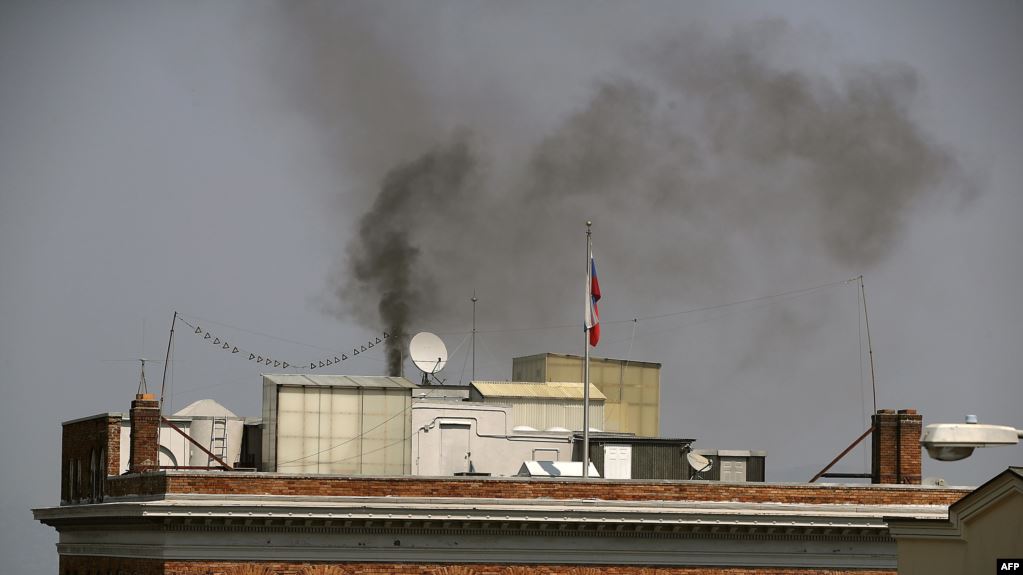
By Polygraph
“Return the diplomatic property, which was seized not only in violation of the Vienna Convention, but in violation of private rights.”
False
The Vienna Convention requires the mutual consent of states for establishing and operating missions
Speaking at the Kremlin-sponsored Valdai Club on July 1, Russian Deputy Foreign Minister Sergey Ryabkov said, “Today, the schizophrenia of the White House’s policy towards Russia has become more obvious than ever.”
To “bring bilateral relations out of a dead-end,” Ryabkov proposed “small steps,” including the “release or exchange” of Konstantin Yaroshenko, the Russian pilot serving a 20-year sentence in the U.S. for conspiracy to smuggle cocaine. The Russian diplomat did not elaborate on the details of the proposed “exchange” or name the U.S. citizens held in Russia who Moscow may be willing to swap.
Ryabkov also called on the U.S. to “return” to Russia the “diplomatic property” that Washington “seized not only in violation of the Vienna Convention, but in violation of private right.”
The deputy foreign minister did not specify the property to which he was referring. However, in December 2016 (under President Barak Obama), the U.S. government closed down two compounds used by Russian diplomats, one in New York state and the other in Maryland, charging they were used for espionage.The following year (under President Donald Trump), the U.S. government closed down a consulate in San Francisco along with two diplomatic annexes in New York and Washington in 2017.
Ryabkov’s claim that the U.S. acted in violation of Vienna Convention is false.
Vienna Convention
More than a dozen of articles of the Vienna Convention detail the “receiving State’s” obligations to guarantee immunity to the diplomatic missions of the “sending State,” even in the cases of complete breakdown of the relations.
For instance, Article 45 states: “If diplomatic relations are broken off between two States, or if a mission is permanently or temporarily recalled: (a) The receiving State must, even in case of armed conflict, respect and protect the premises of the mission, together with its property and archives.”
However, in the case of U.S.-Russian relations, other articles of the Vienna Convention lay the groundwork for a receiving state’s lawful actions towards the diplomatic missions of a sending state.
Article 2 of the Vienna Convention reads: “The establishment of diplomatic relations between States, and of permanent diplomatic missions, takes place by mutual consent.”
Article 11.1 says: “In the absence of specific agreement as to the size of the mission, the receiving State may require that the size of a mission be kept within limits considered by it to be reasonable and normal, having regard to circumstances and conditions in the receiving State and to the needs of the particular mission.”
Article 12 reads: “The sending State may not, without the prior express consent of the receiving State, establish offices forming part of the mission in localities other than those in which the mission itself is established.”
Today, @StateDept announced its decision to expel 60 Russian officials from the United States, including 48 serving at #Russia’s bilateral mission to the United States and 12 intelligence operatives from the Russian Mission to the @UN. https://t.co/hTFIDbyz4k pic.twitter.com/fr3D4oiYTx
— Department of State (@StateDept) March 26, 2018
According to a senior State Department official who spoke on background on September 15, 2017, the U.S. is “confident in the legality” of its actions.
“The Vienna Convention on Consular Relations provides that consular posts are established only with the host state’s consent. The United States has withdrawn its consent for Russia’s consular post in San Francisco. The Vienna Convention on Diplomatic Relations does not prevent restrictions on location of Embassy buildings or annexes,” the official said.
Two retired U.S. diplomats contacted by Polygraph.info said the U.S. actions did not violate the Vienna Convention.
Ambassador Steven Pifer, a senior fellow at the Brookings Institution, said that “the State Department has a legal justification for the closure of the properties.”
John Herbst, director of the Atlantic Council’s Eurasia Center, concurred.
“Of course, the U.S. did not violate the Vienna Convention,” he said. “That convention does not give nations the right to own or lease property in another state with a view to commit espionage. To deny a nation a property to conduct espionage is not, therefore, a violation of the Vienna Convention.”
#OTD in 2011, the FBI arrested 10 Russian Foreign Intelligence Service (SVR) operatives. This 10 year case—dubbed Operation Ghost Stories—was a chilling reminder that espionage on U.S. soil did not disappear after the Cold War ended. #History https://t.co/cF4ko5DoE2
— FBI (@FBI) June 27, 2019
Espionage under Diplomatic Coverage
Indeed, when it comes to the use of diplomatic missions for espionage, Article 41.1 of the Vienna Convention says: “Without prejudice to their privileges and immunities, it is the duty of all persons enjoying such privileges and immunities to respect the laws and regulations of the receiving State. They also have a duty not to interfere in the internal affairs of that State.”
In addition, paragraph 3 of Article 41 reads: “The premises of the mission must not be used in any manner incompatible with the functions of the mission as laid down in the present Convention or by other rules of general international law or by any special agreements in force between the sending and the receiving State.”
According to former and current U.S. intelligence officers, Russia has used the diplomatic privileges of its U.S. missions for espionage over the years.
The now-closed Russian consulate in San Francisco was of a specific concern to U.S. intelligence because it served as the base for Moscow’s espionage efforts on the U.S. Pacific coast. A 2017 investigation by Foreign Policy magazine, headlined “The Secret History of the Russian Consulate in San Francisco,” revealed “an intensive, sustained, and mystifying pattern of espionage emanating from the San Francisco consulate.”




